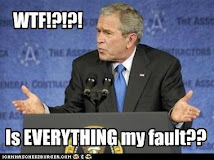The 15 Most Corrupt Members of Congress - They Must Go
EXECUTIVE SUMMARY
CREW’s fifth annual report on congressional corruption includes 15 members of Congress, significantly fewer than last year’s report. While corruption has remained a significant political issue, many elected officials seem to be taking greater care to avoid unethical conduct.
The list shrank primarily because out of the 24 members included in last year’s report, eight are no longer in Congress and seven others were omitted either because no action was taken by any law enforcement agency, or the House or Senate ethics committees, or CREW discovered no additional information to add. New to this year’s list are Senators Roland Burris and John Ensign, and Representatives Nathan Deal, Jesse Jackson, Jr. and Pete Visclosky. After having been off the list for two years, Rep. Maxine Waters has reappeared for unethical activities entirely unrelated to the conduct that landed her on the list in the past.
Of this year’s list of 15, at least 12 are under some sort of investigation: Vern Buchanan, Roland Burris, Ken Calvert, John Ensign, Jesse Jackson Jr., Jerry Lewis, Alan Mollohan, John Murtha, Charlie Rangel, Laura Richardson, Pete Visclosky and Don Young.
This year as every year, members have used their positions to financially benefit themselves, their friends and their families. Earmarks for large campaign contributors are commonplace and many members have traded legislative assistance for personal favors.
Although ethics reforms measures were passed last Congress and the House created the new Office of Congressional Ethics, there still appears to be little enforcement of ethics rules. In the Senate, Sens. Kent Conrad and Chris Dodd were not disciplined in any way for their participation in Countrywide Financial’s VIP loan program. The Senate Select Committee on Ethics sank to an all time low, holding itself -- rather than the senators themselves -- responsible for the senators’ accepting the loans. The Senate Ethics Manual is readily available and it clearly states that loans can be improper gifts. If CREW can read and understand the manual, presumably, senators can too.
As always things are worse in the House, which consistently refuses to condemn any lawmaker’s conduct no matter how outrageous. The investigation of Rep. Rangel, which was only initiated at the lawmaker’s request in the first place, has dragged on for a year with no end in sight. If the committee ever sees fit to release any sort of report regarding Rep. Rangel’s many misdeeds, expect the ethics panel to use the occasion as a “teaching moment,” reminding members of their responsibilities under the ethics rules. Any meaningful censure of Rep. Rangel is unlikely.
Similarly, thanks to Rep. Jeff Flake’s efforts, the House Ethics Committee was forced to reveal it is investigating the PMA scandal, which involves Reps. Murtha and Visclosky and likely other members as well. If history is any guide, however, nothing will come of the committee’s inquiry. If the committee opened the door to permit questions regarding the relationship between earmarks and campaign contributions, few members would be safe from scrutiny.
The Office of Congressional Ethics is now up and running, but it has yet to release any information about its work, leaving CREW to continue to question the office’s utility.
As a result of the Sen. Ted Stevens prosecution debacle and courts’ continued expansive interpretation of the Speech or Debate Clause of the Constitution, expect fewer federal corruption prosecutions of members of Congress in the coming years. First, the Justice Department’s Public Integrity Section is in disarray. Section Chief William Welch remains in place despite the section’s mishandling of the Stevens prosecution and U.S. District Court Judge Emmet Sullivan’s forceful criticism. Thus, the department is likely to be hesitant to investigate, much less bring charges against other members of Congress absent glaring evidence of wrongdoing. Further debilitating criminal prosecutions is the continued expansion of the Speech or Debate Clause. An Arizona federal court is considering whether charges brought against former Rep. Rick Renzi can withstand constitutional challenge. In addition, federal investigators were forced to drop the investigation of former Rep. Tom Feeney after a court ruled the Clause prohibited the House Ethics Committee from providing any incriminating information it had obtained during its own investigation of Rep. Feeney’s conduct in regard to the Jack Abramoff scandal.
Given that the Justice Department has been defanged and the ethics committees are basically worthless, it will be up to the voters to decide if a member of Congress’s conduct disqualifies him from holding a position of public trust.
METHODOLOGY
To create this report, CREW reviewed news media articles, Federal Election Commission reports,1 court documents, and members’ personal financial and travel disclosure forms. We then analyzed that information in light of federal laws and regulations as well as congressional ethics rules.
Rep. Vern Buchanan (R-FL)
Sen. Roland Burris (D-IL)
Rep. Ken Calvert (R-CA)
Rep. Nathan Deal (R-GA)
Sen. John Ensign (R-NV)
Rep. Jesse Jackson, Jr. (D-IL)
Rep. Jerry Lewis (R-CA)
Rep. Alan B. Mollohan (D-WV)
Sen. Mitch McConnell (R-KY)
Rep. John P. Murtha (D-PA)
Rep. Charles B. Rangel (D-NY)
Rep. Laura Richardson (D-CA)
Rep. Pete Visclosky (D-IN)
Rep. Maxine Waters (D-CA)
Rep. Don Young (R-AK)
Wednesday, September 16, 2009
Subscribe to:
Post Comments (Atom)




























No comments:
Post a Comment